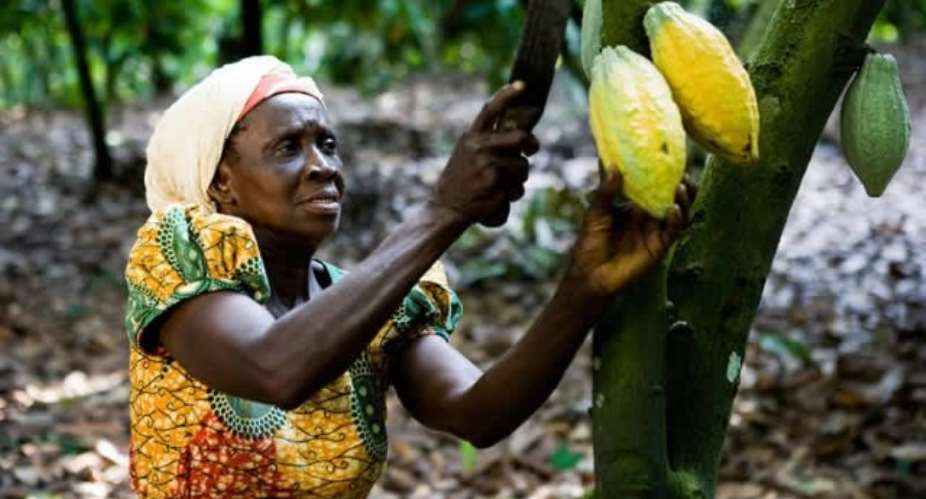One of the 51 Ghanaian students currently on an eleven-month-long intensive agricultural training in Israel has recommended the famous drip irrigation technology as best for the Ghana’s cocoa sector.
Enock Agyemang, who had been working with the Ministry of Agriculture in Ghana before his study tour in Israel, thinks Israel’s drip irrigation system will solve the perennial drying up of cocoa farms in the dry season and thereby boost Ghana’s cocoa production significantly.
“In Ghana, we can introduce the drip system for our cocoa and plantain [farms] which dies in the dry season…” he told Myjoyonline.com in Israel recently.
Enock and the 50 other Ghanaian Agric students are benefiting from the AgroStudies programme, an Israeli initiative, that offers apprenticeship for students.

Photo: Enock Agyemang in Israel
The programme focuses on agriculture capacity building and promotes food security, and is a collaboration between the Government of Ghana’s Ministry of Food & Agriculture and the State of Israel’s Ministry of Foreign Affairs.
Enock Agyemang and seven other agric students from Ghana and other African countries have been assigned to the Danzinger greenhouse farm.
Danziger touts itself as one of the world’s most innovative floriculture companies and has a big presence in Kenya.

Photo: Danzinger’s greenhouse in Israel uses drip irrigation technology extensively for breeding and rooting of flowers.
Drip irrigation technology

Drip irrigation system, also called trickle irrigation, involves dripping water onto the soil at very low rates from a system of small diameter plastic pipes fitted with outlets called emitters or drippers.
Water is applied close to plants so that only part of the soil in which the roots grow becomes wet, unlike surface and sprinkler irrigation, which involves wetting the whole soil profile.
With drip irrigation, water applications are more frequent (usually every 1-3 days) than with other methods and this provides a very favourable high moisture level in the soil in which plants can flourish. The system is suitable for vegetables, soft fruit and cash crops like cocoa.
According to the Food and Agriculture Organisationn (FAO), generally, only high value crops are considered because of the high capital costs of installing a drip system.
The design of the technology is attributed to Israeli water engineer Simcha Blass, and his son, Yeshayahu Blass in 1965.
Ghana cocoa woes
Cocoa remains Ghana’s chief agricultural export and the country’s main cash crop. Ghana is the second largest exporter of cocoa, behind Ivory Coast, however, the production has been faced with major challenges. In 2016, it was estimated that Ghana lost at least 25 percent of its projected cocoa output due to harsh winds and lack of rain.
The Harmattan wind, which blows over Ghana and the Sahara area, saps soil moisture and spoiling seeds.
Harsh weather conditions also stunts pod growth.
Staying ahead
Enock believes that if Ghana invests in the drip irrigation technology, the country could beat Ivory Coast and double its production within months.
Already, he said smart companies are using the technology, one of which is Golden Exotics, a banana production company, which is reaping the benefits of the technology.
“Golden Exotics employs about 1000 workers from the community and its surroundings. If at least about five districts in Ghana are able to establish such a farm I don’t think the youth in Ghana will leave to other countries for a living,” he observes.





 We’ll protect state wealth from opaque deals – Prof Jane Naana
We’ll protect state wealth from opaque deals – Prof Jane Naana
 Mauritania president says running for second term in June polls
Mauritania president says running for second term in June polls
 I won't ever say I was a mere driver’s mate' — Prof. Opoku-Agyemang
I won't ever say I was a mere driver’s mate' — Prof. Opoku-Agyemang
 2024 polls: 'EC struggling to defend credibility'— Prof. Opoku-Agyemang
2024 polls: 'EC struggling to defend credibility'— Prof. Opoku-Agyemang
 Akufo-Addo gov't's 'greed, unbridled arrogance, unrestrained impunity, sheer dis...
Akufo-Addo gov't's 'greed, unbridled arrogance, unrestrained impunity, sheer dis...
 Election 2024: Ghana needs an urgent reset, a leadership that is inspiring – Ma...
Election 2024: Ghana needs an urgent reset, a leadership that is inspiring – Ma...
 Partner NDC to rollout a future of limitless prospects – Prof Jane Naana Opoku-A...
Partner NDC to rollout a future of limitless prospects – Prof Jane Naana Opoku-A...
 NPP will remain in gov’t till Jesus comes — Diana Asamoah
NPP will remain in gov’t till Jesus comes — Diana Asamoah
 Sunyani Technical University demands apology from former SRC president over sex-...
Sunyani Technical University demands apology from former SRC president over sex-...
 'Dumsor' was resolved by Mahama but ‘incompetent' Akufo-Addo has destroyed the g...
'Dumsor' was resolved by Mahama but ‘incompetent' Akufo-Addo has destroyed the g...
